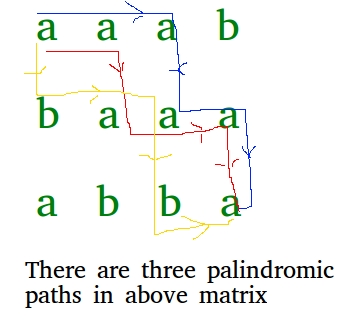给定一个仅包含较低字母字符的矩阵,我们需要计算给定矩阵中回文路径的数量。路径被定义为从左上角单元格开始到右下角单元格结束的一系列单元格。我们只能从当前单元格向右和向下移动。
例子:
Input : mat[][] = {"aaab”,
"baaa”
“abba”}
Output : 3
Number of palindromic paths are 3 from top-left to
bottom-right.
aaaaaa (0, 0) -> (0, 1) -> (1, 1) -> (1, 2) ->
(1, 3) -> (2, 3)
aaaaaa (0, 0) -> (0, 1) -> (0, 2) -> (1, 2) ->
(1, 3) -> (2, 3)
abaaba (0, 0) -> (1, 0) -> (1, 1) -> (1, 2) ->
(2, 2) -> (2, 3) 
我们可以递归地解决这个问题,我们从回文路径的两个角(左上角和右下角)开始。在每次递归调用中,我们维护一个状态,该状态将构成两个单元格,一个从开始到一个从结束,这对于回文属性应该是相等的。如果在一个状态下,两个单元格字符都相等,那么我们递归调用所有可能的双向移动。
由于这可能导致多次解决相同的子问题,我们在下面的代码中使用了一个地图备忘录,其中将计算结果与键作为起始和结束单元格的索引存储,因此如果再次调用具有相同起始和结束单元格的子问题,结果将是直接由 memo 返回,而不是再次重新计算。
请参阅下面的代码以更好地理解,
CPP
// C++ program to get number of palindrome
// paths in matrix
#include
using namespace std;
#define R 3
#define C 4
// struct to represent state of recursion
// and key of map
struct cells
{
// indices of front cell
int rs, cs;
// indices of end cell
int re, ce;
cells(int rs, int cs, int re, int ce)
: rs(rs)
, cs(cs)
, re(re)
, ce(ce)
{
}
// operator overloading to compare two
// cells which rs needed for map
bool operator<(const cells& other) const
{
return ((rs != other.rs) || (cs != other.cs)
|| (re != other.re) || (ce != other.ce));
}
};
// recursive method to return number
// of palindromic paths in matrix
// (rs, cs) ==> Indices of current cell
// from a starting point (First Row)
// (re, ce) ==> Indices of current cell
// from a ending point (Last Row)
// memo ==> To store results of
// already computed problems
int getPalindromicPathsRecur(char mat[R][C],
int rs, int cs,
int re, int ce,
map& memo)
{
// Base Case 1 : if any index rs out of boundary,
// return 0
if (rs < 0 || rs >= R || cs < 0 || cs >= C)
return 0;
if (re < 0 || re < rs || ce < 0 || ce < cs)
return 0;
// Base case 2 : if values are not equal
// then palindrome property rs not satisfied,
// so return 0
if (mat[rs][cs] != mat[re][ce])
return 0;
// If we reach here, then matrix cells are same.
// Base Case 3 : if indices are adjacent then
// return 1
if (abs((rs - re) + (cs - ce)) <= 1)
return 1;
// if result rs precalculated, return from map
if (memo.find(cells(rs, cs, re, ce))
!= memo.end())
return memo[cells(rs, cs, re, ce)];
int ret = 0; // Initialize result
// calling recursively for all possible movements
ret += getPalindromicPathsRecur(mat, rs + 1,
cs, re - 1,
ce, memo);
ret += getPalindromicPathsRecur(mat, rs + 1,
cs, re,
ce - 1, memo);
ret += getPalindromicPathsRecur(mat, rs,
cs + 1, re - 1,
ce, memo);
ret += getPalindromicPathsRecur(mat, rs,
cs + 1, re,
ce - 1, memo);
// storing the calculated result in map
memo[cells(rs, cs, re, ce)] = ret;
return ret;
}
// method returns number of palindromic paths in matrix
int getPalindromicPaths(char mat[R][C])
{
map memo;
return getPalindromicPathsRecur(mat, 0, 0, R - 1, C - 1,
memo);
}
// Driver code
int main()
{
char mat[R][C] = { 'a', 'a', 'a',
'b', 'b', 'a',
'a', 'a', 'a',
'b', 'b', 'a' };
printf("%d", getPalindromicPaths(mat));
return 0;
} 输出
3时间复杂度: O((R x C) 2 )
如果您希望与专家一起参加现场课程,请参阅DSA 现场工作专业课程和学生竞争性编程现场课程。